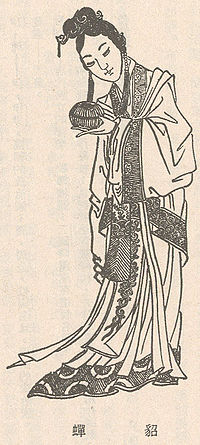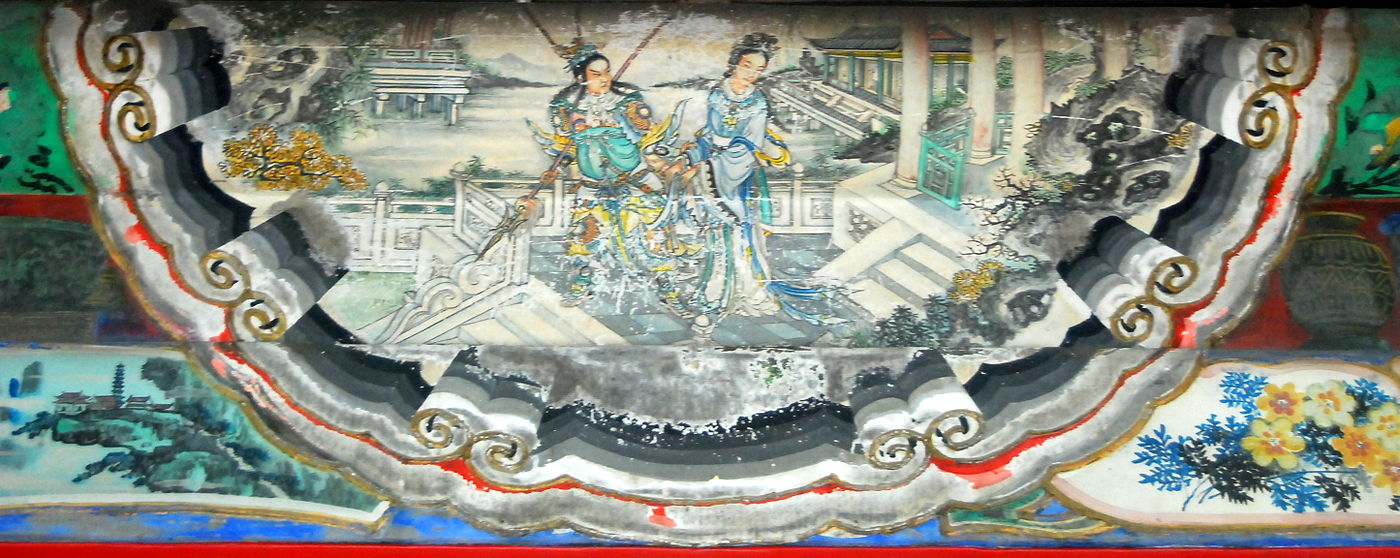- Diaochan
-
Diaochan 
Portrait of Diaochan from a Qing Dynasty edition of Romance of the Three Kingdoms Traditional Chinese 貂蟬 Simplified Chinese 貂蝉 Transcriptions Mandarin - Hanyu Pinyin Diāochán Min - Hokkien POJ Tiau-siâm Diaochan was one of the Four Beauties of ancient China. She was said to have been born in 161 or 169 or 176, depending on the source. However, unlike the other three beauties, there is no known evidence that suggests her existence, therefore she is likely to be a fictional character.
Diaochan appears in Luo Guanzhong's historical novel Romance of the Three Kingdoms in a plot involving the warrior Lü Bu and the warlord Dong Zhuo. According to historical records, Lü Bu did have relations with one of Dong Zhuo's servant maids. However, there is no evidence that the maid's name was "Diaochan". In fact, it is extremely unlikely that it was Diaochan, because "Diao" is hardly used as a Chinese family name. "Diaochan" likely referred to the sable (diao) tails and jade decorations in the shape of cicadas (chan), which at the time adorned the hats of high-level officials.
Contents
In fiction
In the historical novel Romance of the Three Kingdoms, Diaochan assisted the official Wang Yun in a plot to persuade Lü Bu to kill his foster father, the tyrannical warlord Dong Zhuo. Wang Yun presented her to Dong Zhuo as a concubine but at the same time, Wang also betrothed her to Lü Bu. Diaochan used her beauty to turn Dong Zhuo and Lü Bu against each other by inciting jealousy between them.
While Dong Zhuo is out one day, Lü Bu sneaks into his bedroom in hope of seeing Diaochan. Diaochan pretends to be very upset and attempts suicide by throwing herself into the pond, saying that she is ashamed to see Lü Bu as she had been violated by Dong Zhuo. Lü Bu is heartbroken and promises that he will not let her suffer further at the hands of Dong Zhuo. Just then, Dong Zhuo returns and sees them embracing each other. Lü Bu flees while Dong Zhuo chases him with a spear, hurling the weapon at him but misses. On the way, Dong Zhuo meets his advisor, Li Ru, who suggests to him to give up Diaochan and let Lü Bu have her instead, so as to win Lü's trust. Dong Zhuo goes back to Diaochan later and accuses her of betraying his love, saying that he intends to present her to Lü Bu. Diaochan replies indignantly that Lü Bu embraced her against her will, even attempting suicide to "prove her love" for Dong Zhuo. Dong Zhuo is moved and dismisses the idea of relinquishing her.
Lü Bu is outraged and goes to Wang Yun's to vent his frustration. Wang then seizes the opportunity to instigate Lü Bu into joining the plot to kill Dong Zhuo, to which Lü agreed. Lü Bu kills Dong Zhuo while the latter is on his way to a "coronation ceremony;" actually a trap set by Wang Yun and Lü. Dong Zhuo's followers led by Li Jue and Guo Si overrun the capital city Chang'an later to avenge their lord and Lü Bu is defeated in battle and forced to flee. Diaochan's eventual fate differs in various accounts. Some said that she was killed by Dong Zhuo's followers along with Wang Yun after Lü Bu escaped while others claimed that she followed Lü Bu while he roamed the land with his army until he seized Puyang from Cao Cao. In some adaptations of the novel, Diaochan was killed along with Lü Bu after the latter was defeated by Cao Cao and Liu Bei's forces at the Battle of Xiapi.
In folk tales
In one folk tale, Diaochan was captured by Cao Cao after the Battle of Xiapi and he presented her to Guan Yu, hoping to win Guan's loyalty towards him. Guan Yu suspected that he was being tricked when he recalled how Diaochan had betrayed Lü Bu and Dong Zhuo earlier. Guan Yu killed her to prevent her from doing further harm.[citation needed] In another tale, Liu Bei, Guan Yu and Zhang Fei all wanted to marry Diaochan and they argued bitterly over the issue. Guan Yu killed her to end the dispute.
In the Yuan Dynasty play Lianhuan Ji (連環計), Diaochan is said to be the daughter of Ren Ang (任昂), and her real name is Ren Hongchang (任紅昌). She is in charge of taking care of the Sable Cicada Hat (貂蟬冠), and is hence known as "Diaochan" ("Diaochan" translates to "Sable Cicada"). She is introduced to Guan Yu by Zhang Fei after Lü Bu's death. Instead of accepting her as the spoils of war, Guan Yu decapitates her with his sword. This event is not mentioned in historical records or Romance of the Three Kingdoms, but is propagated through mass media such as operas and storytelling.[1] In another tale, Guan Yu did meet Diaochan but he let her become a nun instead. When Cao Cao heard that, he wanted to take Diaochan for himself and Diaochan committed suicide when she heard that.
Modern references
Diaochan appears a playable character in Koei's Dynasty Warriors and Warriors Orochi video game series. Her name is spelled as "Diao Chan" in the games.
See also
- List of people of the Three Kingdoms
- List of fictional people of the Three Kingdoms
- List of Dynasty Warriors characters
References
- Books
- Luo Guanzhong. Romance of the Three Kingdoms, Chapters 10-11.
- Hua Gu (1996). Virgin Widows. Trans. Howard Goldblatt. Honolulu: University of Hawaii Press. pp. 104, 105. ISBN 978-0-8248-1770-1. OCLC 33407434. http://books.google.com.pe/books?id=HBS8E6J3HNAC&pg=PA104&dq=diao+chan#PPA105,M1.
- Harris, Rachel (2004). Singing the village : music, memory, and ritual among the Sibe of Xinjiang. Oxford, New York: British Academy by Oxford University Press. ISBN 978-0-19-726297-9. OCLC 56539097. http://books.google.com.pe/books?id=sQlxJdK6wGUC&pg=PA119&dq=diao+chan#PPA119,M1.
- Off, Greg (2005). Dynasty Warriors 5: Prima Official Game Guide. Roseville: Prima Games. ISBN 978-0-7615-5141-6. OCLC 62162042. http://books.google.com/books?id=zMrwAAAACAAJ&dq=dynasty+warriors+5.
Categories:- Fictional people of the Three Kingdoms
Wikimedia Foundation. 2010.

